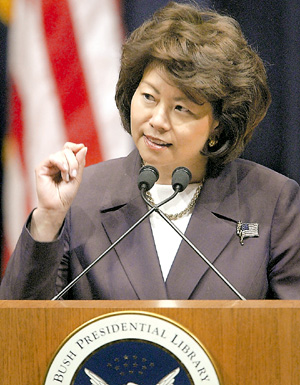
Chao's pro-China coup at Heritage?
Chao's pro-China coup at Heritage?
Think tank ousted PLA expert after Labor nod frowned on his warnings
By Paul Sperry
© 2001 WorldNetDaily.com
WASHINGTON -- A Heritage Foundation military analyst who sounded warnings about Chinese threats to U.S. security was shown the door after Elaine L. Chao, the conservative think tank's top Asian studies adviser, complained about his policy writings, WorldNetDaily has learned.
Chao's views on China have come under closer scrutiny after President-elect Bush picked her to head the Labor Department. As a Cabinet member, she would have top-secret clearance and be in regular contact with national security officials.
As WorldNetDaily earlier reported, her China-born father is on a first-name basis with Chinese President Jiang Zemin, who also heads the state Communist Party and Central Military Commission. Her father also owns a shipping company that does business with China.
Some reports by the ousted Heritage analyst -- 16-year veteran Richard Fisher Jr. -- were footnoted in the declassified version of the bipartisan Cox Report, which documented Chinese espionage at U.S. defense labs, while warning of the CMC's goal of modernizing the People's Liberation Army to project power out past the mainland's waters, targeting U.S. allies like Taiwan and even the U.S.
The Cox Report also rankled Chao, Heritage insiders say.
Elaine Chao
"Elaine Chao was part of the deal that got Rick Fisher fired from Heritage," said a congressional aide who's worked with him on China matters. "She pushed him out not because of free-trade issues, but because he raised national security concerns over China."
A Heritage insider agreed: "She was not supportive of any of his writings on the Chinese military."
Fisher, who was Asian Studies Center director, left the think tank in May 1999. He now works as an analyst for the Jamestown Foundation.
Asked about his departure, Heritage spokeswoman Khristine Bershers said, "I don't know if anyone at Heritage can comment on why he left, except for him."
Fisher declined comment.
Chao, who's sequestered from the press until after her confirmation hearings, joined Heritage in 1996, replacing former Reagan national security aide Richard V. Allen as head of the Asian Studies Center advisory council.
The Greenberg connection
Sources say one of her patrons has been Heritage donor Maurice "Hank" Greenberg, a pro-China lobbyist whose insurance company does business in China.
During last spring's debate over normalizing trade with China, Greenberg protested a Heritage paper by analyst Stephen J. Yates. It suggested Congress postpone the vote on the trade bill to consider adding national security measures, such as tightening controls on exports with military applications.
After Greenberg threatened to cut off funding, Heritage issued a new report: "How Trade with China Benefits Americans," which was co-authored by Fisher's replacement, Larry M. Wortzel, at the Asian Studies Center.
The May 5, 2000, report buried concerns about China's defense build-up and its hunger for military-related exports.
"Heritage back-pedaled," an insider said.
Greenberg also was upset by Fisher's papers sounding alarms about PLA threats to Taiwan and U.S. security. Fisher, who has observed military exercises in China, detailed his findings in reports such as, "China's Threats to Taiwan Challenging U.S. Leadership," "China's Expansion in the Spratley Islands" and "Foreign Arms Acquisition and PLA Modernization."
Greenberg, chairman and chief executive of New York-based American International Group, gave Heritage $180,000 in 1998 and at least $100,000 a year for more than a decade through his Starr Foundation, named after American International Group's founder.
McConnell backer
Greenberg and AIG, through its employee PAC, also have donated thousands of dollars to Chao's husband, Sen. Mitch McConnell, federal records show.
The Kentucky Republican happens to be one of Capitol Hill's biggest China boosters. He lobbied hard for permanent normal trade.
So did AIG. It led a multimillion-dollar ad blitz to help pass last year's trade bill with China.
Together with five other corporate giants, the $26 billion-in-sales American International Group formed the Business Coalition for U.S.-China Trade, which took out full-page ads in major newspapers in favor of the bill.
Also, the insurer took the lead in forming the U.S.-China Education Foundation to help spin the press on the benefits of open trade with China.
AIG, with offices in Shanghai, is a major client of Henry A. Kissinger, who has gotten rich as a paid consultant for U.S. companies seeking greater access to China. Kissinger is close to Greenberg, former head of the U.S.-China Business Council, a pro-China lobby group.
"Hank Greenberg is Kissinger's money bags," said the Hill aide, who asked not to be named.
'Kissinger's money bags'
McConnell and Greenberg also appear to be close.
The senator has given paid speeches for AIG, and has stepped in on its behalf in federal disputes.
In 1987, for example, McConnell tried to spare AIG from having to pay claims on the $200 million policy it underwrote for the U.S. Embassy in Moscow. The bugged building had to be rebuilt.
Also, McConnell and Chao attended a White House dinner with Greenberg in 1994.
Like Chao, Greenberg was one of the "Bush Pioneers," responsible for raising more than $100,000 for the president-elect's campaign. Bush's father, one-time U.S. ambassador to China, took the insurance magnate along with him on his '92 trade mission to Asia.
Leveraging politicians to drum up overseas business is one thing. But why would an insurance executive get involved in national security policy at an influential think tank?
"Because his benefactors in Beijing more than likely told him he'd be wise to oppose American national security if he wants to keep selling insurance policies out of Shanghai," the congressional aide said. "That's the way the communists do 'business.' "
After Greenberg's '92 Asian trip, American International Group became the first foreign company allowed to sell insurance in China.
